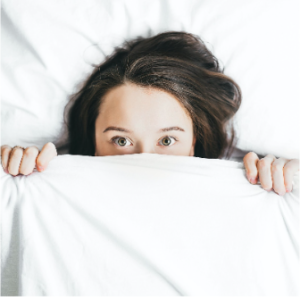The busy world remains awake nowadays and there is a rise in stress levels. While there is job stress or irregular working hours, the maximum impact is seen on sleeping patterns. Lack of sleep or short resting hours are giving rise to a lot of mental and physical issues. Overthinking and staying awake is also a pattern seen in millions of people around the world. So, the quality of rest is also an important area to focus on and cure the internal issues for a healthy and relaxed mind.

Sleep and Mindfulness: Importance & Benefits
About 10-25% of the general population suffers from sleep disorders. As a result, there are multiple disorders like anxiety, mood swings, cardiovascular disease, and obesity. The regular recommended sleeping hours per day is 8 hours which is not followed and when it drops below 7 hours then it results in diabetes, heart disease, or any other chronic disease like memory issues. Major problems which are visible are fatigue and mental imbalance. A better and required amount of sleep relaxes the body and mind which reduces stress and fatigue. It also improves memory or mental clarity and a better immune system. Regular sleeping habits also reduce the risks of Alzheimer’s disease.
Clinical psychology and mind medicine is using mindfulness for more than 20 years as an effective tool. In 1970 Jon Kabat-Zinn first introduced or bought mindfulness into clinical practice at the University of Massachusetts. Mindfulness is also used in cognitive-behavioral approaches, ACT (acceptance & commitment therapy), and behavioral medicine. Other psychiatric disorders like anxiety, depression, and addiction are also treated with mindfulness. Mindfulness practice makes people aware of their mental patterns and how to manage their thoughts with regular stress and challenges. People learn to handle and respond to these challenges positively and effectively. Mindfulness meditation can also be called the training or technique to improve concentration, sleep, and reduce stress. However, it also demands commitment with regular practice to work on the overall mental health of the individual effectively.
Insomnia: Symptoms, effects & cure
Chronic sleep disorders result in insomnia. Most women are seen suffering from insomnia more than men. It is not a permanent condition but should be treated soon to cure and avoid problems related to chronic insomnia. There are three types of insomnia as below:
- Transient insomnia – Lower than one month.
- Short-term insomnia – One and six months.
- Chronic insomnia – Above six months.
When difficulties in sleep arise during insomnia, sleeping aids are given. But sleep aids or medications have potential side effects like behavioral changes, headaches, or memory issues.
Meditation helps with multiple cases like helping to fall asleep quickly and improving the quality of sleep. Sound sleep gives better energy and alertness of mind every day. Meditation is recommended before bed at night to improve sleeping issues and relax. There are different techniques in guided meditation. We can explain the process briefly as below:
Begin with lying down on the bed and begin breathing exercises to regulate your breathing. Then a mindful body scanning following your breath from head to toe takes your body to relax completely and relieve all tension. Now some meditation and visualization processes continue which can also be termed sleep-focused meditation. Next is counting which silences your mind slowly and focuses calmly on your mind for a few minutes. Mindfulness meditation is also recommended during the day by Dr. Benson for additional benefits.

Some other factors to consider for improvement in sleeping disorders are as below:
- Routine
A consistent routine or maintaining timings of sleeping and waking up the next day helps to regulate sleep daily. Nowadays this is becoming difficult but if managed on regular basis it is possible to avoid sleeping disorders.
- Exercise or activity
Regular walks, yoga, or any kind of exercise for some time daily assists in the quality of sleep. Morning exercises are better than late evening and help sleep easily at night. Exposure to daylight or sunlight also helps in improving sleep quality.
- Diet
Some food or beverages are sleep stealers like tea or coffee. Moderate consumption is advised. It is not good to consume caffeine late in the evening for better sleep. While almonds, chamomile tea, kiwi, and walnuts are good to consume before sleep.
- Bedtime tips
The environment and the area of your sleep play a vital role. Try to avoid noise and excess lights.
Comfortable sleepwear and a clean room also give you a fresh cozy environment. It is also good to keep electronic devices like laptops or mobile away from your bed to avoid any disturbances.

Conclusion
There are studies and surveys on the benefits of mindfulness meditation and how to improve working on it for improvement and reduce issues related to sleep. Future research also focuses on proper reporting and identifying factors of risks or issues to have a better understanding and improvement of the issues. The focus is also to make the facilities or treatments affordable for low-income groups. Awareness and care are also important factors to be considered individually and treated. If there is unnecessary stress or workload then time management, a nutritious diet, or medical assistance on time can help avoid severe health issues or chronic problems.
13/07/2022





